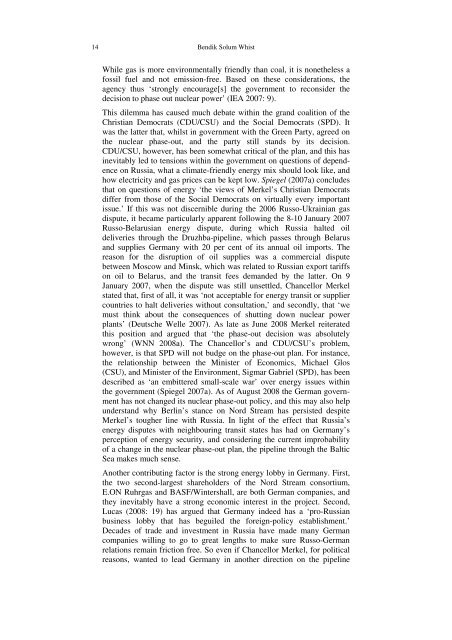Nord Stream: Not Just a Pipeline
Nord Stream: Not Just a Pipeline
Nord Stream: Not Just a Pipeline
Create successful ePaper yourself
Turn your PDF publications into a flip-book with our unique Google optimized e-Paper software.
14 Bendik Solum Whist<br />
While gas is more environmentally friendly than coal, it is nonetheless a<br />
fossil fuel and not emission-free. Based on these considerations, the<br />
agency thus ‘strongly encourage[s] the government to reconsider the<br />
decision to phase out nuclear power’ (IEA 2007: 9).<br />
This dilemma has caused much debate within the grand coalition of the<br />
Christian Democrats (CDU/CSU) and the Social Democrats (SPD). It<br />
was the latter that, whilst in government with the Green Party, agreed on<br />
the nuclear phase-out, and the party still stands by its decision.<br />
CDU/CSU, however, has been somewhat critical of the plan, and this has<br />
inevitably led to tensions within the government on questions of dependence<br />
on Russia, what a climate-friendly energy mix should look like, and<br />
how electricity and gas prices can be kept low. Spiegel (2007a) concludes<br />
that on questions of energy ‘the views of Merkel’s Christian Democrats<br />
differ from those of the Social Democrats on virtually every important<br />
issue.’ If this was not discernible during the 2006 Russo-Ukrainian gas<br />
dispute, it became particularly apparent following the 8-10 January 2007<br />
Russo-Belarusian energy dispute, during which Russia halted oil<br />
deliveries through the Druzhba-pipeline, which passes through Belarus<br />
and supplies Germany with 20 per cent of its annual oil imports. The<br />
reason for the disruption of oil supplies was a commercial dispute<br />
between Moscow and Minsk, which was related to Russian export tariffs<br />
on oil to Belarus, and the transit fees demanded by the latter. On 9<br />
January 2007, when the dispute was still unsettled, Chancellor Merkel<br />
stated that, first of all, it was ‘not acceptable for energy transit or supplier<br />
countries to halt deliveries without consultation,’ and secondly, that ‘we<br />
must think about the consequences of shutting down nuclear power<br />
plants’ (Deutsche Welle 2007). As late as June 2008 Merkel reiterated<br />
this position and argued that ‘the phase-out decision was absolutely<br />
wrong’ (WNN 2008a). The Chancellor’s and CDU/CSU’s problem,<br />
however, is that SPD will not budge on the phase-out plan. For instance,<br />
the relationship between the Minister of Economics, Michael Glos<br />
(CSU), and Minister of the Environment, Sigmar Gabriel (SPD), has been<br />
described as ‘an embittered small-scale war’ over energy issues within<br />
the government (Spiegel 2007a). As of August 2008 the German government<br />
has not changed its nuclear phase-out policy, and this may also help<br />
understand why Berlin’s stance on <strong>Nord</strong> <strong>Stream</strong> has persisted despite<br />
Merkel’s tougher line with Russia. In light of the effect that Russia’s<br />
energy disputes with neighbouring transit states has had on Germany’s<br />
perception of energy security, and considering the current improbability<br />
of a change in the nuclear phase-out plan, the pipeline through the Baltic<br />
Sea makes much sense.<br />
Another contributing factor is the strong energy lobby in Germany. First,<br />
the two second-largest shareholders of the <strong>Nord</strong> <strong>Stream</strong> consortium,<br />
E.ON Ruhrgas and BASF/Wintershall, are both German companies, and<br />
they inevitably have a strong economic interest in the project. Second,<br />
Lucas (2008: 19) has argued that Germany indeed has a ‘pro-Russian<br />
business lobby that has beguiled the foreign-policy establishment.’<br />
Decades of trade and investment in Russia have made many German<br />
companies willing to go to great lengths to make sure Russo-German<br />
relations remain friction free. So even if Chancellor Merkel, for political<br />
reasons, wanted to lead Germany in another direction on the pipeline













